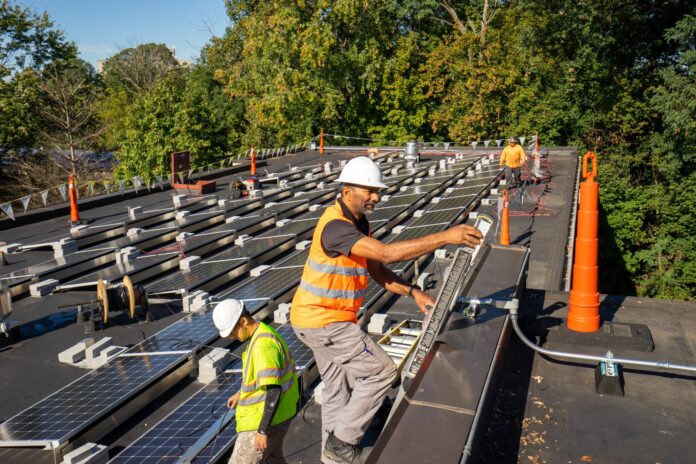"Rallying the Clean Energy Front: From Vulnerability to Victory in a Political Battlefield"
The Solar and Wind Industries Face New Challenges Amid Legislative Changes
In a significant shift for the renewable energy sector, recent legislative actions have raised alarms about the future of solar and wind industries in the United States. Just weeks ago, Congress passed a budget package framed as fiscal reform, which critics argue directly undermines clean energy initiatives. With critical tax credits set to expire in 2027 and new foreign content rules poised to inflate project costs, experts predict dire consequences, including the potential loss of 830,000 jobs, soaring energy bills, and widespread investor uncertainty.
A Calculated Political Shift
The current landscape reflects a calculated political maneuver against clean energy, as powerful interests have increasingly targeted the sector. Despite notable advancements in cost reduction, innovation, and job creation, the renewable energy industry finds itself politically outmatched. Trade associations, once robust advocates for clean energy, are now spending less on influence and education compared to a decade ago, while opposition groups ramp up their efforts.
The recent budget bill is not merely a setback for the fossil fuel industry; it signifies a broader political strategy that has outmaneuvered clean energy advocates. The need for a unified response is urgent. Industry leaders are calling for a "wartime footing," emphasizing that political power must be treated as essential infrastructure rather than an optional component of business strategy.
States as New Battlegrounds
As the federal government retreats from supporting clean energy, states have emerged as critical battlegrounds. Local policies will shape the future of renewable energy, with state commissions and permitting boards often influenced by fossil fuel interests. California, for example, is stepping up to fill the leadership void with initiatives like SB 541, which aims to lower costs and enhance grid resilience through smart technologies.
Conversely, Texas has demonstrated that bipartisan coalitions can effectively counter anti-renewable legislation. Recent legislative sessions saw the defeat of several anti-renewable bills, thanks to a coalition of clean energy employers, rural cooperatives, and even oil and gas groups. This collaborative approach has led to a significant reduction in blackout risks and maintained energy prices below the national average.
Public Support Wanes
Compounding the challenges faced by the renewable sector is a worrying decline in public support. Recent polling data reveals a drop in enthusiasm for solar tax credits and offshore wind projects, even among Democratic voters. Pew Research indicates that Republican support for solar initiatives has plummeted by 20 points since 2020, with over 15% of U.S. counties now banning or blocking utility-scale clean energy projects.
This decline in public sentiment poses a significant threat to the renewable energy agenda. As support wanes, it becomes easier for opponents to repeal incentives and spread misinformation. Without a strong voter base advocating for clean energy, lawmakers may feel little pressure to resist fossil fuel interests.
Strategies for Political Resilience
To combat these challenges, industry leaders propose four key strategies:
-
Shape Public Opinion: A coordinated media strategy is essential to counter misconceptions about the cost and safety of renewable energy. By sharing success stories and emphasizing the benefits of clean energy, the industry can reshape public perception.
-
Mobilize Grassroots Support: Building a local presence is crucial. Engaging community members in discussions about energy choices can amplify voices advocating for clean energy at the local level.
-
Align with Workers and Consumers: Clean energy initiatives should prioritize job creation and affordability. By framing clean energy as a means to provide good jobs and lower costs, the industry can appeal to a broader audience.
- Elect Supportive Leaders: Encouraging individuals with firsthand experience in clean energy to run for office can help ensure that policies reflect the needs of the industry. Leaders who understand the intricacies of renewable energy can advocate more effectively for supportive legislation.
Funding the Fight
Ultimately, the success of these strategies hinges on adequate funding. The opposition has demonstrated a willingness to invest heavily in advocacy, while the clean energy sector must significantly increase its financial commitment to organizing, education, and legal defense.
The recent legislative changes did not pass due to merit; they succeeded because the clean energy sector lacked the political power to resist them. While the economics of renewable energy may be favorable, political victories require sustained effort and resources.
As the industry faces these new challenges, it must leverage its strengths in innovation and collaboration to build a robust political infrastructure. By adopting a proactive approach and mobilizing support at all levels, the renewable energy sector can navigate this turbulent landscape and continue to thrive in the long term.
